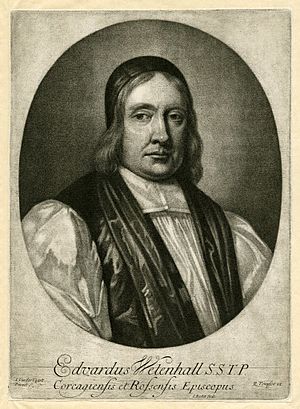Edward Wetenhall facts for kids
Edward Wetenhall (born 1636, died 1713) was an important English bishop in the Church of Ireland. His name is sometimes spelled differently, like Wettenhall or Whitnall.
Contents
Edward Wetenhall's Early Life and Education
Edward Wetenhall was born in Lichfield, England, on October 7, 1636. He went to Westminster School, which was a famous school at the time. Later, he studied at Trinity College, Cambridge, and then at Lincoln College, Oxford. He earned his first university degree in 1660.
Becoming a Bishop in Ireland
After finishing his studies, Wetenhall worked as a priest in different places in England. He became a prebend (a type of church official) at Exeter Cathedral and was also the headmaster of a school there.
In 1672, the Archbishop of Dublin, Michael Boyle the younger, invited Wetenhall to come to Dublin, Ireland. There, he became the headmaster of the blue-coat school and worked in several churches.
In 1679, Edward Wetenhall became the bishop of Cork and Ross. This meant he was a senior leader in the Church of Ireland for the areas of Cork and Ross. He worked hard to fix up the bishop's home in Cork using his own money.
Challenges and Changes in Ireland
During a time of political trouble in Ireland, starting around 1688, Wetenhall was one of only seven bishops who stayed in the country. He faced many difficulties from supporters of King James II. He was even called to attend a special parliament set up by King James II in 1689.
Wetenhall was known for trying to make peace. He believed in being fair to Dissenters, who were Protestants who didn't fully agree with the main Church of England. He also tried to calm down arguments about religious ideas.
In 1699, Wetenhall became the bishop of Kilmore and Ardagh. He worked to restore the bishop's home in Kilmore and rebuilt the cathedral in Ardagh. He also helped get back church lands that had been lost. He was also keen on making sure religious books were available in the Irish language.
Later Years and Legacy
Edward Wetenhall spent his later years in London, England. He passed away on November 12, 1713, and was buried in Westminster Abbey, a very famous church. In his will, he said he believed the Church of England and Ireland was "the purest church in the world," but he also thought some things could be improved.
Edward Wetenhall's Writings
Edward Wetenhall wrote many books and pamphlets. Some of his works include:
- Enter into Thy Closet: A Method … for Private Devotion (1666) – A guide for personal prayer.
- The Catechism of the Church of England, with Marginal Notes (1678) – A book explaining the basic beliefs of the Church.
- The Protestant Peacemaker (1682) – A book where he argued for more understanding between different Protestant groups.
- A Plain Discourse proving the … Authority of the … Scriptures (1688) – A book about the importance of the Bible.
- A Method … to be … prepared for Death (1694) – A guide on how to prepare for death.
He also helped revise important Latin and Greek grammar books used in schools, which shows his interest in education.
Family Life
Edward Wetenhall was married twice. His second wife was Philippa D'Oyly. His oldest son from his first marriage was also named Edward Wetenhall, and he became a doctor.
 | Madam C. J. Walker |
 | Janet Emerson Bashen |
 | Annie Turnbo Malone |
 | Maggie L. Walker |


